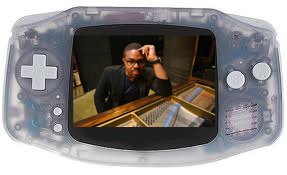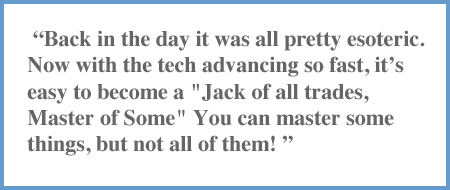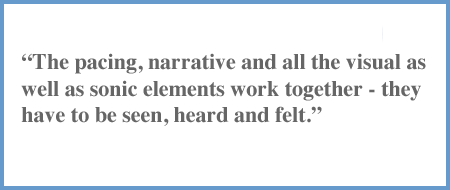Chase Bethea - Living the Game Audio Dream

Chase Bethea is a freelance Composer, Sound Designer & Audio Engineer for Games and Multimedia. Chase began his career as an intern at Mobotory Games in 2011 while simultaneously going to school for his AA in Music Theory and Composition. Much can be learned from his level of enthusiasm and dedication to the craft of Game Audio.

Discussion
101:
Hi Chase, I see you are from Chicago and moved to California, the mecca of game development.
CHASE:
Yes, born and raised in Chicago before moving to California. There used to be some game studios in Chicago in the 90's but I was more of just a gamer back then. I moved to California in 2001 and was making alot of music but with game sounds. Eventually people starting saying it sounded like video game music, so in 2009 I went back to school and did a research paper on Game Audio. I had to bridge the gap with the theory and fundamentals.
101:
We are now living the golden age of making music on a computer. It's so easy to just skim the surface and never master the tools. Skimming the surface has it's advantages though!
CHASE:
Absolutely, all of the tools became more accessable when it all when from pro to prosumer. You can go to Best Buy now and get the sound card, speakers, etc. Back in the day it was all pretty esoteric. Now with the tech advancing so fast, its easy to become a "jack of all trades, master of some" - you can master some things, but not all of them!
101:
Right, you really have to choose your weapons wisely. It can take a lifetime to master one, just like kung fu styles! It's so cool to now see the general public learning about things like 'siibilance' which was unheard of a few years back. Fundamental information is now widely available. How did you catch the fever early on?

CHASE:
I was listening to alot of game audio since about 5th grade. I would do sound tests on my Gameboy while learning the saxophone and trying to transcribe songs. Back then it was Turok and Battle of the Bionosaurs, Final Fantasy and Tomb Raider. I then discovered the CD player on the playstation and a new whole just opened up. I was listening as well as playing.
101:
How did your first Game Audio gig come about?
CHASE:
I was reading the classic book "The Complete Guide to Game Audio" by Aaron Marks. I learned so much from that. By chapter 5 or 6 I was like "You know what, I'm ready!" I knew I wanted to do this. I went online and scoured the forums for any help needed and just stayed diligent about reaching out and networking with game developers. My first job was an internship at a mobile game company and it actually happened through my job at Lens Crafters. A coworkers uncle was in the industry and mentioned needing audio which led to an in-house position. I was still in school at the time too. I was trying to put together a portfolio and show studios that I had done something and make a name for myself. The project was great also becuase I was in there testing it and everything. it was a real paid gig.
101:
Yeah, the Aaron Marks book was like this beacon of hope for so many people. For me, it sent a clear message that Game Audio is the greatest career in human history, and it's 100% possible. It as the perfect roadmap to the industry and I recently ordered the updated version. I hope to meet Aaron someday - he is kind of a hero and even reviewed my own ebook. There's actually a lot of heros in Game Audio!
CHASE:
Yes, thats so true! When I realized I was going to do this, I was still in school learning the fundamentals and had been wanting to go to GDC for years. I thought I would get the expo pass and just wing it but ended up meeting alot of heros which was great becuase I knew and respected all of their work.
101:
For those that live outside of California, there are conferences all over the world now. These are perfect for finding developers that need help while presenting yourself as a source for audio. On the job training is the best training but getting to that point can take considerable effort. Your website is the perfect template for how a professional should present themself.
CHASE:
I think about the site everyday and what I need to update and improve. It's alot of work and my friend helpded build everything.
101:
It has all the elements in place and the project tiles cycling and an overall clean presentation. What are you working on lately?
CHASE:
Recently, I'm working on sound design for a game called Pathfinder as well as music and sound design for one called Aground. Of course, there are others I cant even talk about yet!
101:
I see you have your soundtracks up on Amazon. This is another advantage of indie projects - being able to own, share or sell your work.
CHASE:
Of all the 14 games I've done, Super Happy Fun block was the best contract I wrote. I've built this master template that has taken me three years to write. It incorporates samples from other contracts and I build upon each one and tailor it cover all the bases. I use it for projects when I'm trying to negotiate certain percentage upfront or on the backend as well as net profit agreements. It includes soundtracks, performance rights and things like youtube and streamers while staying as legal as possible. I've been reading contracts since I was 16yrs old. My mom would tell how people don't like reading contracts and they end up being taken advantage of. I've taken two music business classes - one when I got my first degree on audio engineering school and another during my bachelor degree program.
101:
That's a rare skill! Developers appreciate that professional approach as it builds respect early in the project and gives them confidence that the game audio will be handled. What is your workflow looking like now in the studio?
CHASE:
Technically, I'm using Cubase 8 and a MIDI keyboard. Starting to use more live instruments in my compositions now since my latest project "< /reality >". After mixing, I use Sound Forge to check levels and give it some final polish with a few transients and fades, making sure everything is sounding as good a possible. I've also been using S Layer by Twisted Tools for sound design. It's so quick and unique and really helps with polish, as opposed to the traditional layering technique with individual files. I'm constantly improving my workflow. It's a never ending quest for the perfect sound palette.
101:
Everyone is jumping on Reaper these days due to the flexibility with integrations and price. Any thoughts?
CHASE:
Yeah, it's cheap and user friendly. The guy is really responsive to requests for the next build. It's priced up there with Logic and people are beginning to jumping ship more and more. Then you have Nuendo, which is kind of expensive.
101:
I'm a Pro Tools guy and just know it so well that I haven't tried anything else. I started on Acid 3.0, back before Sony bought it.
CHASE:
Yes! I totally remember Acid
101:
What have you been learning lately?
CHASE:
I'm learning the Unreal engine at my current job and Blueprint and Perforce, etc. After creating the music and sound, you have to implement everything, push it to the server and make sure its downloaded and synced up. It's a lot to understand - the engineering and coding and how it all works together. Then you have developers wanting to port to multiple platforms and things can get real challenging
101:
What tips do you have for people that are new to Game Audio
CHASE:
Well the competition is fierce now. One thing that bothers me (and they never taught this in school) is that a lot of new people trying to break in don't even play games. If you play games then you are miles ahead of the competition right from the start. Some veterans may scoff and say they don't have time to play games, but the reality is that playing games puts you ahead of the curve. Your production chops may be through the roof but you're still missing half of the equation. You've got to have the influences and know where this all started, period. These developers are playing the indie games, the triple A games and enjoying it immensely. They play them all the time and have the connection. You've got to do your homework and put in the research about the industry you want to be in.
101:
Exactly, you've got to love games, period. Otherwise, you will get steamrolled by people with far more passion.
CHASE:
Absolutely. People talk to me and I'm reciting release dates and when classic titles came out and what platform, etc. I grew up with it all and love this so much. It just makes sense to me and it's what I choose to absorb.
 101:
101:
A lot of the Game Audio veterans got angry when film composers started to enter the scene. It's like "wait, you've never even played games?" It's hard to even comprehend that someone hasn't played games
CHASE:
I resonate with that so much! It's like, how have you not played Metal Gear Solid? What is wrong with you! Someone who has will always be knocking it out of the park. The pacing, narrative and all the visual as well as sonic elements work together - they have to be seen, heard and felt.
101:
It's such an inclusive industry that I feel some have taken advantage and stomped in from other industries.
CHASE:
Yeah! My metaphor is "so you want to do Film music.. but you don't watch films?!" It doesn't make any sense! They should be studying the scores and listening to them closely
101:
And then you have Anime, where all these worlds connect. Did you watch the recent Castlevania adaptation into an Anime series? I binge watched the whole thing and may do it again!
CHASE:
You have to! It's only 4 episodes I literally did the same thing and just let it run. I'm thinking oh my gosh this is just great. I know that it's based off Castlevania 3 but actually never played 3. I thought it was based off Symphony of the Night and Lord of Shadows.
101:
I had no idea that was the real story! The depth and nuances in the story really show how one dimensional my world was paying it on the NES, but playing that old game left so much to the imagination. The side scrolling glory days. They totally breathed life into the story though. My only complaint was the lack of memorable music. I didn't recognize any of the music, although it was well put together
CHASE:
Yeah, Angry Video Game Nerd did a review of it and complained about the lack of that iconic score. It was nowhere to be heard. Which was true . Maybe in the next one they will have a homage to something from the original score. They really did it right though and I actually workout to the music of Symphony of the Night, Turok Battle of the Binosaurs. The music just knocks you out.
101:
What are some of your favorite games?
CHASE:
Well, you have Castlevania Symphony of the Night, Turok Battle of the Binosaurs on GameBoy, Beyond Oasis on Sega Genesis - My goodness, I do an honest speed run with no glitches beating that game in 7 hours. That's one of my favorite games of all time. And I have to add Eternal Ring to list. That was like a hidden gem and a first person RPG that I actually beat. Growing up, I would turn of the Game Boy and go to sound test and let it ride. Just listening to it in the background or playing for hours. There's something about these obscure retro titles that just sounds great.
101:
Yeah, the key is originality. There are so many covers today in game music as well as traditional music. In many cases, the original was mediocre, at best! I think it's a reflection of how conservative the listening habits have become.
CHASE:
Yes. I concur with you so much! Stretch your ears a bit guys, there's so much great game music out there. You've got to have the passion! Play the games, catch the passion and learn the tech.
101:
Chase, thanks so much it was great talking with you.!
CHASE:
You too! I owe you a big thank you. I actually found the 101 site back in the day and it helped to put me on this path.
Visit the official Chase Bethea site HERE






